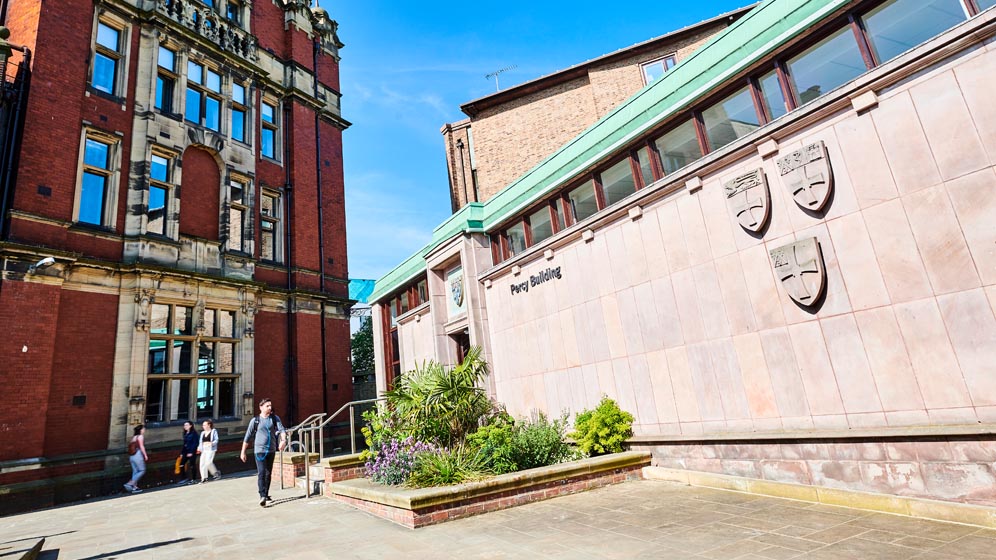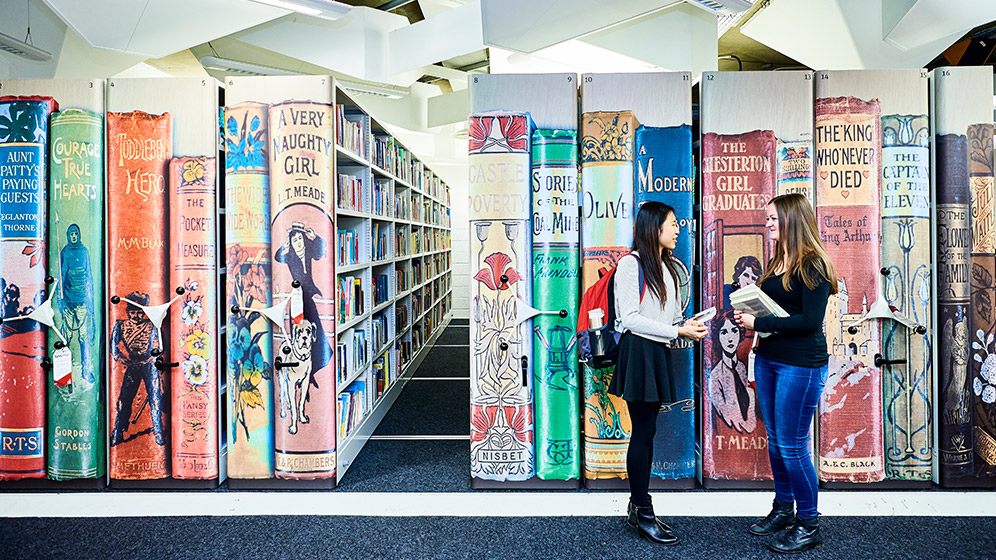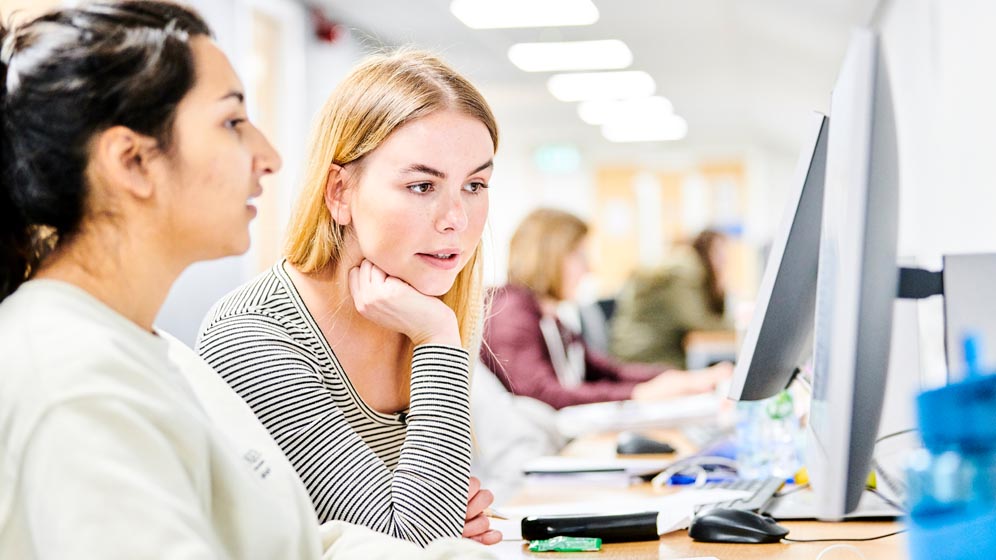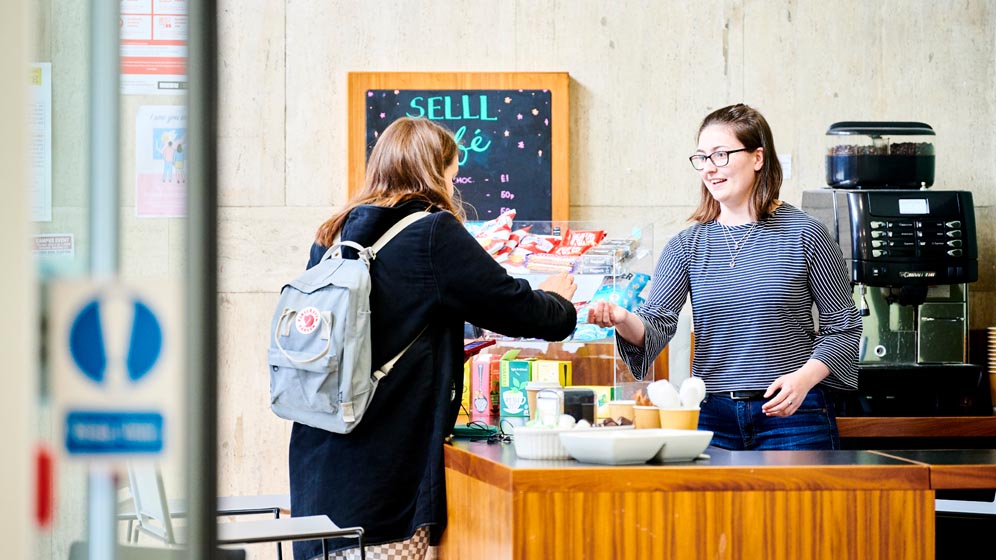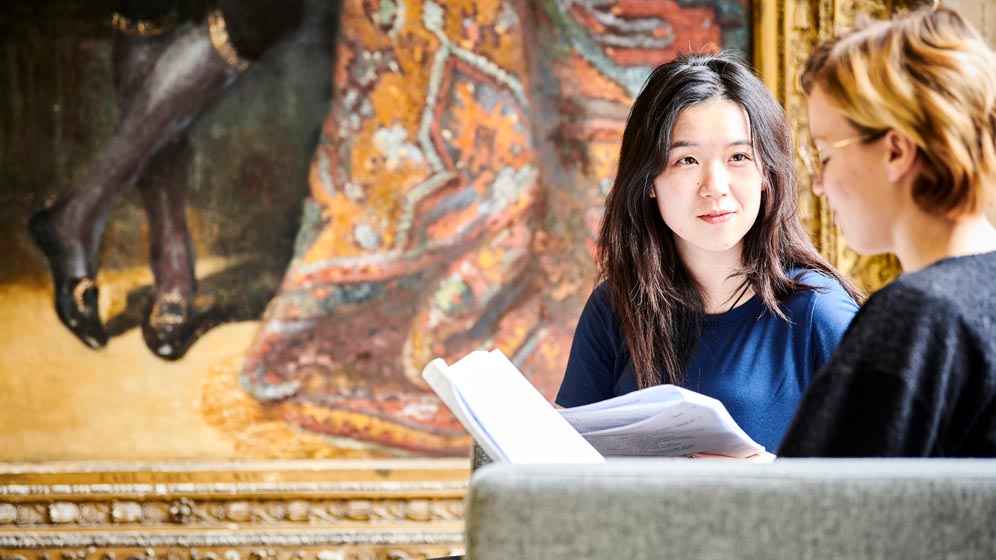English Literature with Creative Writing BA Honours
- UCAS code: QW38
- Full time
- 3 years
Discover the power of words on our Literature with Creative Writing BA Honours degree. Our engaging programme will teach you to write, read, and think both critically and creatively.
You are currently viewing course information for entry year: 2026
Next start date:
- September 2026
UCAS Institution name and code:
- NEWC / N21
Course overview
Our English Literature with Creative Writing BA brings together criticism and creativity, with opportunities to study and write poetry, prose, film, and plays.
Whether you’re polishing a short story, learning about literature and postcolonialism, or writing your own poetry, you’ll be working alongside our world-leading researchers and internationally acclaimed writers and filmmakers.
At our Newcastle Centre for the Literary Arts, you’ll have the chance to meet creative artists. You can join workshops on everything from finding an agent to creating a fantasy language. Plus, you can gain experience in arts management.
You'll also have the flexibility to choose how much creative writing you do. For more details, explore our modules section.
At the end of this three-year degree, you will:
- have the critical skills to analyse a wide range of literature
- have the practical skills to produce creative writing of a professional standard, and build a literary career
- have critical and creative skills that many other employers value highly
- be ready to take further steps towards a career in the creative arts
Your course and study experience - disclaimers and terms and conditions
Please rest assured we make all reasonable efforts to provide you with the programmes, services and facilities described. However, it may be necessary to make changes due to significant disruption, for example in response to Covid-19.
View our Academic experience page, which gives information about your Newcastle University study experience for the academic year 2025-26.
See our terms and conditions and student complaints information, which gives details of circumstances that may lead to changes to programmes, modules or University services.
Quality and ranking
Professional accreditation and recognition
All professional accreditations are reviewed regularly by their professional body.
Modules and learning
Modules
The information below is intended to provide an example of what you will study.
Most degrees are divided into stages. Each stage lasts for one academic year, and you'll complete modules totalling 120 credits by the end of each stage.
Our teaching is informed by research. Course content may change periodically to reflect developments in the discipline, the requirements of external bodies and partners, and student feedback.
Featured module
SEL2215: Creative PracticeDevelop your knowledge, understanding and experience of a range of creative approaches to writing.

Optional module availability
Student demand for optional modules may affect availability.
Full details of the modules on offer will be published through the Programme Regulations and Specifications ahead of each academic year. This usually happens in May.
To find out more please see our terms and conditions
You'll be introduced to a variety of literary texts, including works of poetry, prose, drama and film. You'll build a foundation in the critical and theoretical skills you need for your studies in stages 2 and 3.
You will explore different ways of approaching creative writing. You will develop your creativity and gain experience in writing in different forms.
Pathways
Before you start your degree you'll choose between the following pathways:
- English Literature with Creative Writing - on this pathway you will spend a third of your time on Creative Writing and two thirds studying English Literature.
- English Literature and Creative Writing - on this pathway you will split your time equally between Creative Writing and English Literature.
When you graduate, your degree transcript will show either 'English Literature with Creative Writing' or 'English Literature and Creative Writing', depending on which pathway you choose in stage 1.
English Literature with Creative Writing pathway
| Compulsory modules | Credits |
|---|---|
| Introduction to Creative Writing | 20 |
| Transformations | 20 |
| Drama, Theatre and Performance | 20 |
| Doing Criticism | 20 |
| Beginnings | 20 |
| Revolutions | 20 |
English Literature and Creative Writing pathway
| Compulsory modules | Credits |
|---|---|
| Introduction to Creative Writing | 20 |
| Drama, Theatre and Performance | 20 |
| Doing Criticism | 20 |
| Beginnings | 20 |
| Revolutions | 20 |
| Introduction to Creative Writing 2 | 20 |
You will advance your understanding of literature through the ages, and take at least one pre-19th-century module alongside at least one focusing on modern or contemporary topics.
In Creative Writing, you will develop your craft and literary techniques in prose, theatre script, poetry or screenwriting.
English Literature with Creative Writing pathway
| Compulsory modules | Credits |
|---|---|
| Creative Practice | 20 |
You will take one of the following modules:
| Modules | Credits |
|---|---|
| Poetry Workshop | 20 |
| Theatre Script Workshop | 20 |
| Prose Workshop | 20 |
| Screenwriting Workshop | 20 |
You will take one and may take up to three of the following modules:
| Modules | Credits |
|---|---|
| Renaissance Bodies | 20 |
| Writing New Worlds, 1688-1789 | 20 |
| Revolutionary Britain, 1789-1832 | 20 |
| Stagecraft in Early Drama | 20 |
You will take one and may take up to three of the following modules:
| Modules | Credits |
|---|---|
| Victorian Passions: Victorian Values | 20 |
| Contemporary Cultures | 20 |
| Literatures of Decolonisation | 20 |
| Early 20th Century American Literature | 20 |
You may take the module below:
| Optional modules | Credits |
|---|---|
| Career Development for second year students | 20 |
English Literature and Creative Writing pathway
| Compulsory modules | Credits |
|---|---|
| Creative Practice | 20 |
You will take two of the following modules:
| Modules | Credits |
|---|---|
| Poetry Workshop | 20 |
| Theatre Script Workshop | 20 |
| Prose Workshop | 20 |
| Screenwriting Workshop | 20 |
You will take one and may take up to two of the following modules:
| Modules | Credits |
|---|---|
| Renaissance Bodies | 20 |
| Writing New Worlds, 1688-1789 | 20 |
| Revolutionary Britain, 1789-1832 | 20 |
| Stagecraft in Early Drama | 20 |
You will take one and may take up to two of the following modules:
| Modules | Credits |
|---|---|
| Victorian Passions: Victorian Values | 20 |
| Contemporary Cultures | 20 |
| Literatures of Decolonisation | 20 |
| Early 20th Century American Literature | 20 |
You may take the module below:
| Optional modules | Credits |
|---|---|
| Career Development for second year students | 20 |
You will be supported in the production of an original piece of literary work in an area of your interest, in either prose, theatre script, poetry or screenwriting.
Your portfolio will bring together everything you’ve learnt about creative writing and allow you to devise a project that demonstrates development as a writer.
You'll choose four specialist options in literature, taking modules that cover both pre-19th century and post-19th century topics.
Current options include The Victorian Novel, British and International Children’s Literature, Romantic Poetry, Postcolonial Literature, Medieval Literature, American Literature, and Contemporary Documentary. Or, you can also do a work placement in the cultural industries.
English Literature with Creative Writing Pathway
You will take one of the following modules:
| Modules | Credits |
|---|---|
| Prose Portfolio | 40 |
| Theatre Script Portfolio | 40 |
| Poetry Portfolio | 40 |
| Screenwriting Portfolio | 40 |
You will take one, and may take up to three of the following modules:
You will take one, and may take up to three of the following modules:
You may choose the following optional module:
| Module | Credits |
|---|---|
| Career Development for final year students | 20 |
English Literature and Creative Writing Pathway
You will take one of the following modules:
| Modules | Credits |
|---|---|
| Prose Portfolio | 40 |
| Theatre Script Portfolio | 40 |
| Poetry Portfolio | 40 |
| Screenwriting Portfolio | 40 |
You will take the following compulsory module:
| Modules | Credits |
|---|---|
| Creative Practice 3 | 20 |
You will take three of the following modules:
We base these figures and graphs on the most up-to-date information available to us. They are based on the modules chosen by our students in 2024-25.
Teaching time is made up of:
- scheduled learning and teaching activities. These are timetabled activities with a member of staff present.
- structured guided learning. These are activities developed by staff to support engagement with module learning. Students or groups of students undertake these activities without direct staff participation or supervision
Teaching and assessment
Teaching methods
You can normally expect to spend around 10 hours per week attending lectures, seminars and workshops. You also spend around 25 hours per week on class preparation, reading, writing, and other kinds of independent research recommended by your tutor.
Assessment methods
You'll be assessed through a combination of:
-
Assignments – written or fieldwork
-
Coursework
-
Essays
-
Examinations – practical or online
-
Group work
-
Portfolio submission
-
Presentations
-
Reflective report/journal
-
Seminar tasks/exercises
Skills and experience
Practical experience
Our Creative Writing instructors are all practicing professional writers, filmmakers and playwrights. Their expertly modelled teaching aims to prepare you for a future career in the creative industries.
When you study English Literature at Newcastle, you will also enjoy regular field trips organised by the School. These include visits to:
- The Wordsworth Trust (Dove Cottage)
- Seven Stories (the National Centre for Children's Books)
- various city theatres including Northern Stage, Live Theatre and Theatre Royal as well as the Tyneside Cinema
Business skills
Our modules provide a huge number of transferable skills.
You will have the opportunity to learn to:
- work independently
- manage projects
- write clear and persuasive prose
- analyse complex datasets and sources.
You'll have the opportunity to gain real-world work experience in the cultural industries in Stage 3. We also offer modules in partnership with the Careers Service in Stage 2 and 3.
Employability
Employability and the engagement of literature with the wider world go hand-in-hand in this degree.
Many of our literature modules, particularly in Stage 3, model their assessments on the kind of tasks you might be employed to do:
- drafting website copy
- curating exhibitions
- writing persuasive arguments
- writing enthralling creative fiction.
Beyond our modules, there are plenty of extracurricular opportunities. These range from freelance work for Newcastle University's student newspaper, to paid internships in our department.
In particular, the Newcastle Centre for Literary Arts hires students to work on everything from event management to app design. The centre also runs workshops with professionals in the creative industries.
Opportunities
Study abroad
You can study abroad for one semester in your second year as part of this degree. In Europe we have links with:
- Ghent University, Belgium
- Leipzig University, Germany
- Groningen University, Netherlands
- Radboud University Nijmegen, Netherlands
We also have links with universities in other parts of the world, including Australia, Brazil, Canada, Hong Kong, Singapore, South Korea and the USA, including, but not limited to:
- Monash University, Australia
- University of Sydney, Australia
- McGill University, Canada
- University of Hong Kong
- University of Vermont, USA
Find out more about Study Abroad.
Work placement
During your degree, you’ll have multiple opportunities to undertake a meaningful work placement. In your second and third years, you may choose to take the Career Development Module which offers academic credit for 50 hours of placement. You can choose to carry out your placement via part-time work, volunteering, or in a local school. You will be assessed through a mixture of written work, presentations, and professional skills assessment.
In addition, you'll have the option to spend 9 to 12 months on a work placement. You will receive University support from our dedicated Careers team to help you secure your dream placement in the UK or abroad. Work placements take place between stages 2 and 3.
You'll gain first-hand experience of working in a sector, putting your learning into practice, and developing your professional expertise. Previous placements have been in a range of sectors, including:
- journalism and broadcasting
- sustainable energy
- politics
- digital media and marketing
- education
- finance
- museum and heritage
- travel and tourism
If you choose to take a work placement, it will extend your degree by a year. Placements are subject to availability.
Facilities and environment
Facilities
You'll be based in the School of English Literature, Language and Linguistics. The School is located in the Percy Building, which is at the heart of our city-centre campus. You'll join a lively community of students, academics, writers, and professionals.
You'll have access to:
- a digital media lab – for students with documentary and film-making modules
- a PC cluster
- a student-led café
- plenty of spaces to work and socialise
You will have exceptional library provision from our award-winning Library Service. It houses over one million books and a huge range of electronic resources.
Our literature and creative writing teaching is linked to the Newcastle Centre for the Literary Arts (NCLA) programme. This will give you regular contact with leading creative artists. You'll also have access to a diverse programme of events, including spoken-word events and creative writing courses.
Find out more about the School of English Literature, Language and Linguistics.
Support
You'll have the support of an academic member of staff as a Personal Tutor throughout your degree to help with academic and personal issues affecting your academic progress.
Peer Mentors will help you in your first year. They are fellow students who can help you settle in and answer questions you may have when starting university.
Your future
Industry links
Our alumni include:
- Peter Straughan (screenwriter of Tinker, Tailor, Soldier, Spy)
- Andy Bird (former chairman of Walt Disney International)
- Neil Astley (writer and founder of Bloodaxe publishing house)
- Teresa Graham, CBE (policy maker, government advisor and advocate for women in business)
- John Yorke (former head of Channel 4 drama and former Controller of BBC Drama Production)
- Pippa Crerar (Political Editor, The Guardian)
- Ruth Sunderland (Business Editor, The Daily Mail)
Students studying this degree develop a range of valuable skills, which they can transfer to many different sectors. Your literary training can be used in journalism, librarianship, and teaching and our graduates have gone into a variety of career areas including marketing, law, politics.
Our graduates have achieved success working in the film and TV media industry as well as in videogame and software development.
Sorry, you need JavaScript to view this video
Follow in their footsteps

- Name: Will
- Nationality: British
- Graduated: 2015
- Now working as: Author
'You can’t beat the experience of having an expert and engaged tutor read your work and say "Not quite", "Not quite", and then, finally, "That’s it!"'.
Find out what Will liked the most about studying English Literature with Creative Writing at Newcastle University and how this degree helped him in his career as an author.
Careers support
Our Careers Service is one of the largest and best in the country, and we have strong links with employers. We provide an extensive range of opportunities to all students through our ncl+ initiative.
Visit our Careers Service website
Recognition of professional qualifications outside of the UK
If you’re studying an accredited degree and thinking about working in Europe after you graduate, the best place to find current information is the UK Government’s guidance on recognition of UK professional qualifications in EU member states. This official resource explains whether your profession is regulated in another country, what steps you need to take, and which organisation you should contact.
Entry requirements
All candidates are considered on an individual basis and we accept a broad range of qualifications.
The entrance requirements and offers below apply to 2026 entry.
| A-Level | |
|---|---|
| International Baccalaureate | |
|---|---|
Other UK and the Republic of Ireland qualifications
Alternative offers at Newcastle
Through one of our contextual or alternative offer routes, you could receive an offer of up to three grades lower than the typical requirements.
Contextual offers
We use certain contextual data from your UCAS form, alongside your application, to consider challenges that you may have faced in your education and the potential effect this may have had on your qualifications. This means you may be eligible to receive a lower contextual offer.
PARTNERS offers
One of the largest and longest support entry routes to university of its kind for students from underrepresented backgrounds. We support applicants from application through to study.
Realising Opportunities offers
A unique programme delivered in collaboration with 10 leading, research-intensive universities in the UK. The programme is open to students in Year 12/first year of college.
Pathways to Newcastle offers
Pathways to Newcastle, our national skills entry route, is available for specific subject areas.
High Performance Athletes
We support promising athletes at the application stage, who compete in regional, national or international levels in their sport.
Qualifications from outside the UK
English Language requirements
Entrance courses (INTO)
International Pathway courses are specialist programmes designed for international students who want to study in the UK. We provide a range of study options for international students in partnership with INTO.
These courses are specifically designed for international students who want to study in the UK and progress onto one of our undergraduate degrees. Our International Study Centre, has a range of study options including:
- International Foundation
- International Year One
- English Language courses
Find out more about International Pathway courses
Admissions policy
This policy applies to all undergraduate and postgraduate admissions at Newcastle University. It is intended to provide information about our admissions policies and procedures to applicants and potential applicants, to their advisors and family members, and to staff of the University.
University Admissions Policy and related policies and procedures
Credit transfer and Recognition of Prior Learning
Recognition of Prior Learning (RPL) can allow you to convert existing relevant university-level knowledge, skills and experience into credits towards a qualification. Find out more about the RPL policy which may apply to this course.
Tuition fees and scholarships
Tuition fees for academic year 2026-2027
The 2026 entry home fees have not yet been confirmed.
| Qualification: BA Honours | |
|---|---|
|
Home students full time 3 years |
Tuition fees (Year 1)
Not set |
|
International students full time 3 years |
Tuition fees (Year 1)
24,500 |
Year abroad and additional costs
For programmes where you can spend a year on a work placement or studying abroad, you will receive a significant fee reduction for that year.
Some of our degrees involve additional costs which are not covered by your tuition fees.
Scholarships
Find out more about:
Open days and events
You'll have a number of opportunities to meet us throughout the year at our on-campus and virtual open days.
You'll be able to:
- explore our beautiful campus
- find out about our vibrant city
- discover what students think about studying at Newcastle
You'll also have the opportunity to speak to academic staff and find out more about the subjects you're interested in.
Find out about how you can visit Newcastle in person and virtually.
We regularly travel overseas to meet with students interested in studying at Newcastle University. Visit our events calendar to find out when we're visiting your region.
How to apply
Apply through UCAS
To apply for undergraduate study at Newcastle University, you must use the online application system managed by the Universities and Colleges Admissions Service (UCAS). All UK schools and colleges, and a small number of EU and international establishments, are registered with UCAS. You will need:
- the UCAS name and institution codes for Newcastle University (NEWC/N21)
- the UCAS code for the course you want to apply for
- the UCAS 'buzzword' for your school or college
If you are applying independently, or are applying from a school or college which is not registered to manage applications, you will still use the Apply system. You will not need a buzzword.
Apply through UCASApply through an agent
International students often apply to us through an agent. Have a look at our recommended agents and get in touch with them.
Get in touch
By phone
Call us on +44 (0) 191 208 3333 and press option 1. Our opening hours are Monday to Friday 10am until 4pm.
Live chat
Our NCL chatbot might be able to give you an answer straight away. If not, it’ll direct you to someone who can help.
You'll find our NCL chatbot in the bottom right of this page.
Online
Chat to our students
Choosing a university is a big decision. If you've got questions about a particular course, student life or the city of Newcastle, why not chat to our friendly students or graduates!
Keep updated
We regularly send email updates and extra information about the University.
Receive regular updates by email








